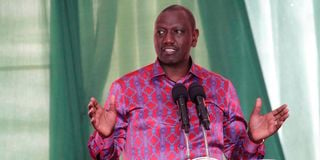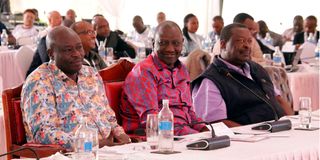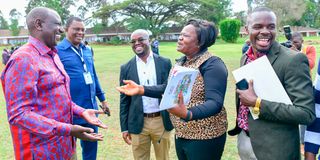Premium
Keeping up with Ruto: How government officials found the going tough in Nanyuki

President William Ruto addresses government officials at the Inaugural Retreat for Cabinet and Senior Ranks of the Executive at Fairmont Mount Kenya Safari Club in Nyeri County on January 7, 2023.
President William Ruto subjected his Cabinet and senior civil servants to a three-day crash programme at a retreat in Nanyuki, where punctuality was the order of the day, with meetings starting at 7.30 am and running to 9 pm.
The meeting at the five-star Fairmont Mount Kenya Safari Club brought together Cabinet and principal secretaries, and a retinue of advisors in Dr Ruto’s administration such as Dr David Ndii (Council of Economic Advisors), Dr Kamau Thugge (Fiscal Affairs and Budget Policy), and Dr Augustine Cheruiyot (Economic Transformation Secretariat).
Sunday Nation has pieced together intrigues said to have culminated in an evening bonfire chat the President, his deputy Rigathi Gachagua and Prime Cabinet Secretary Musalia Mudavadi had with the other senior government officials.
Dr Ruto is known for his punctuality and ability to stay up as late as midnight. Breakfast was served at 6.30 am, with the first sessions beginning promptly at 7.30 am.
So strict was the President on timekeeping that on Friday, he threw out three senior officials who came in late, forcing the ministers and top officials to dare not come late for yesterday’s sessions, Sunday Nation has learnt.
The top government officials were then clustered—groups of ministries—and required to come up with 90-day deliverables, complete with the source of funding after Dr Ruto demanded that they avoid projects that would require borrowing.

President William Ruto, his deputy Rigathi Gachagua and Prime Cabinet Secretary Musalia Mudavadi at the Inaugural Retreat for Cabinet and Senior Ranks of the Executive at Fairmont Mount Kenya Safari Club in Nyeri County on January 7, 2023.
Manifesto tweaks
Dr Ndii, with his team, took the CSs, PSs and other senior officials through the Kenya Kwanza manifesto, highlighting tweaks that had since been made after Dr Ruto was sworn into office more than 100 days ago.
Faced with a Sh9 trillion debt, the President has since turned his focus on the collection of more taxes, targeting Sh4.8 trillion in tax revenue by June 2027, which portends an additional tax implication of Sh1.1 trillion on top of the National Treasury’s earlier projections of Sh3.77 trillion for the same period.
The Treasury expects to collect Sh2.03 trillion by June, supported by “robust indirect and custom taxes on account of the pass-through of higher international prices and the somewhat weaker-than-originally-anticipated shilling,” the exchequer said.
Yesterday, the ministers, who had been placed in clusters, were then made to present their deliverables, before fielding questions from the plenary, and a final fine-tuning with the advisors.
Sources we spoke to yesterday described an inquisitive president who demanded concise clear answers on the planned projects, and how the ministers intend to align with the manifesto. “We have been having many sessions and the President sits in all. It has been non-traditional whereby the President opens the retreat and leaves. On each day, we have been finishing very late. Breakfast is served at 6.30 am and the meeting starts at 7 am and runs up to 9 pm,” a Cabinet minister told Sunday Nation.
Yet another added: “Every presentation was geared towards service delivery and how to turn around the economy because the President has said poverty has to be dealt with. Using 20 per cent to get 80 per cent in the economy.”
Ties with governors
Yesterday, Dr Ruto met with chairpersons of committees in the Council of Governors, as well as the Senate and National Assembly leadership, and promised accountability and a government that works together to achieve one dream. He also tasked Mr Gachagua to oversee the working relationship between the national and county governments.
“The Office of the Deputy President will have a state department that will oversee the relationship between the national and county governments. I deliberately assigned that responsibility to the office of the deputy president so that we can amicably work with the county governments,” Dr Ruto said.

President William Ruto with Homa Bay Governor Gladys Wanga during the Intergovernmental Relations session at Fairmont Mount Kenya Safari Club, Laikipia County.
He promised to convene a retreat between the Executive and governors to explore areas of collaboration. “The Constitution directs us to work together... As I have undertaken, we are going to have a retreat with our governors so that we can agree in the first summit on how to support government programmes. You will see more CSs and PSs in your counties and they will be becoming there appreciating that you are the leaders in those respective counties,” Dr Ruto said.
He also asked the leadership of Parliament to develop a framework on how internal disputes between the two Houses would be settled out of court.
“We should be able to sort those issues out without necessarily using public resources to battle in court within government agencies. We have agreed with National Assembly and Senate majority leaders that even the matters that are pending in court, we are going to find a mechanism for an out-of-court settlement so that we can prosecute the important issues that affect the people.
“We want to run an accountable government and we want the oversight role of government to be manifest in all our operations,” the Head of State said.
He told Parliament to amend their Standing Orders to make it mandatory for Cabinet Secretaries to appear before departmental committees to prosecute the government’s agenda. “We have chairpersons of parliamentary committees who attempt to answer questions of the Executive in Parliament. That does not make sense because they are not members of the Executive. We are trying to correct such things to make Parliament orderly in the execution of their mandate.”
During the engagement session, Dr Ruto delegated Mr Mudavadi the role of overseeing the working relationship between Parliament and the Executive.
“The office of the Prime Cabinet Secretary will have a state department that will oversee the relationship between the Executive and the Legislature. I suggest that even as you formulate the final amendment to the Standing Order, his office is engaged so that we can agree on how to have all questions answered in Parliament by CSs,” he said.

President William Ruto (right) with Deputy President Rigathi Gachagua (left) and Prime Cabinet Minister Musalia Mudavadi (centre) during the 2nd Day of the Inaugural Retreat for Cabinet and Senior Ranks of the Executive at Fairmont Mount Kenya Safari Club, Laikipia County.
Costly court battles
He further warned government ministries and departments against suing each other, saying his administration will not incur expenditures to cater for their legal costs. Dr Ruto argues that unnecessary litigations pitting government agencies against others have resulted in the loss of public funds. He called for a streamlined framework to resolve disputes internally.
“I have already given very clear instructions to government ministries and departments, which, for some reasons, take their counterparts to court, and we end up paying huge resources to lawyers. Any government agency that decides to take its counterpart to court will pay using their own money,” Dr Ruto said.
“I will not accept government resources to be used to pay lawyers for one government agency to take another government agency to court….it will not happen. We have to be honest and honourable because there are sufficient structures within government for us to sort out unnecessary disputes that occur in government institutions.”
In his speech, Mr Gachagua reminded the CSs and PSs that the success of the Kenya Kwanza administration depends on them and it would only be reelected come 2027 in case it delivers on its promises, hence there is no shortcut.
“We are all charged with the responsibility of helping our leader to execute his mandate and fulfil the contract with the people of Kenya. We are here to listen to him because he is the one who carries the mandate. As much as we help him, he is the one who is accountable to the people of Kenya. It is, therefore, prudent that we listen to him.
“We also have a responsibility to vindicate and assure the people of Kenya that the President exercised wisdom in choosing you in that privilege to serve,” DP Gachagua told the senior government officials.
Joint efforts
A speech by Mr Mudavadi lifted a lid off the key agenda of the meeting—a look into an economic turnaround with less or zero borrowing, but also a renewed bid to gel and work as a team, with the President insisting on the officials succeeding as a team, or failing individually.
“We are here today not just to retreat but to fellowship, for we are driven by a common cause. We can only triumph if we all believe in the cause and pull together in the unity of purpose. An ounce of deviation or destruction by any one of us can collapse the entire mission,” Mr Mudavadi said.
To the President, Mr Mudavadi said: “I will be seeking your support to deal firmly with the derailleurs so that we deliver on the Kenya Kwanza legacy and lay a strong foundation to confirm to our detractors that you were not just lucky or guessing, but you mean business.”
Mr Mudavadi, who will be charged with service delivery accountability, said there will be no place for corruption, a point later emphasised by the President, who threatened to sack any minister caught in graft.
“There is one issue that we must also be wary of—corruption. The greed for material wealth that drives us into corruption prevents us from realising our full potential,” said Mr Mudavadi.






